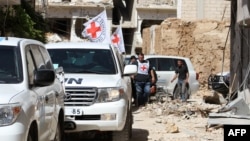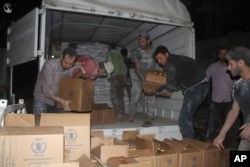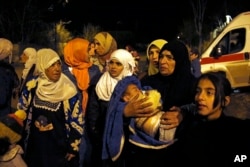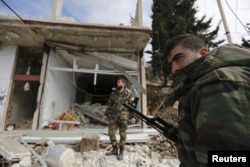The contrast couldn't be greater. International aid reached Syrian government-controlled areas in Latakia and Deir ez-Zor provinces Monday and Tuesday. Those aid deliveries came just three days after the government targeted the town of Daraya for airstrikes, hours after U.N. agencies delivered aid to the rebel-held Damascus suburb for the first time in almost four years.
Opposition politicians say if proof was needed that the government of President Bashar al-Assad manipulates aid, here it is. The city of Latakia is not even besieged, they add.
In most wars, combatants wield aid as a weapon, circumscribing humanitarian access to enemy-held territory, hoping hunger will starve resistance into submission and undermine the morale of foes. In no war is this truer than in Syria, where the horror of a vicious conflict has been compounded by aid being held hostage to politics and combat, according to analysts and Western diplomats.
And, for the most part, it is the Assad government that blocks and restricts humanitarian access.
"This is not an accident, but rather part of a deliberate ploy to use human suffering as a strategy of warfare," said James Denselow, an analyst at the Foreign Policy Center, a U.K.-based foreign affairs research organization.
The Dayara aid delivery followed weeks of international negotiations. U.N. agencies and Western governments had been pressing for humanitarian access to more than 19 towns and districts besieged by Assad government forces. Many have not seen any food or humanitarian shipments in years.
The United States and Britain have been among the foremost Western powers pushing for international relief agencies to be granted unimpeded access, stressing the insufficiency of the small amounts of aid the Assad regime has allowed through to rebel-controlled areas since a cessation-of-hostilities deal was struck in February.
Airdrops controversial
Western powers have urged the United Nations to consider airdrops to towns denied aid by Damascus. But the U.N. envoy to Syria, Staffan de Mistura, has been reluctant to endorse that approach, arguing that effective aid delivery will need the blessing of the Assad regime. One of the reasons, his officials say, is that airdropped supplies can easily go astray, missing their target and falling into the hands of those who are not the intended recipients.
What befell Dayara after it received a nine-truck convoy of aid Saturday could well make other towns think twice about receiving aid deliveries. Dayara's opposition council described the government's follow-up as a "violent and concentrated bombing" and says it caused "enormous devastation."
What can the United Nations do to ensure Syria's besieged citizens get food, and then don't get bombed by Assad forces after receiving an aid delivery? Not much, U.N. officials concede.
"This is a political issue for political leaders or peacemakers to sort out," Jane Howard, a spokeswoman for the World Food Organization, said in an interview with a German television outlet. "The World Food Program is really left picking up the pieces."
The lack of adequate medical care, food and shelter has added to the death toll and misery that has made Syria the world's worst humanitarian catastrophe this century. More than 4 million Syrians live in hard-to-reach areas and close to 500,000 people live in besieged areas that are on the brink of starvation, the United Nations estimates. Some NGOs calculate the number of starving could be closer to 1 million.
Repeating past patterns
From the start of the conflict six years ago, the Assad government has controlled the distribution of international aid for its own ends, restricting access to war-torn areas, say U.N. officials.
Damascus has refused to permit U.N. agencies or nongovernmental organization partners from moving supplies across the northern border with Turkey or the southern border with Jordan into rebel-held areas on pain that they will be expelled from Damascus.
Even when permission is granted for an aid convoy, the go-ahead is often withdrawn at the last moment.
Opposition activists complain that by abiding by the government’s strictures, the United Nations has in effect allowed aid to be used as a weapon of war. Rebel militias, as well as the Islamic State terror group and Jabhat al-Nusra, al-Qaida's affiliate in Syria, also block aid convoys or want to oversee distribution among local communities they control. But 90 percent of besieged areas are encircled by government forces, seen as the major culprit.
Even before the Daraya bombing, there had been doubts about the credibility of a regime promise earlier this month to allow aid to flow freely to 15 of 19 designated besieged towns and districts.
Before the delivery, Bouthaina Shaaban, an Assad adviser, insisted, "Nobody is starving in Daraya," which was "producing peas and beans, and food and wild berries that is enough for the entire Syria."
Now the focus again is on whether to start airdropping aid to the starving. That is likely to be on the agenda Thursday, when Russian President Vladimir Putin meets U.N. Secretary-General Ban Ki-moon and de Mistura in St. Petersburg.







